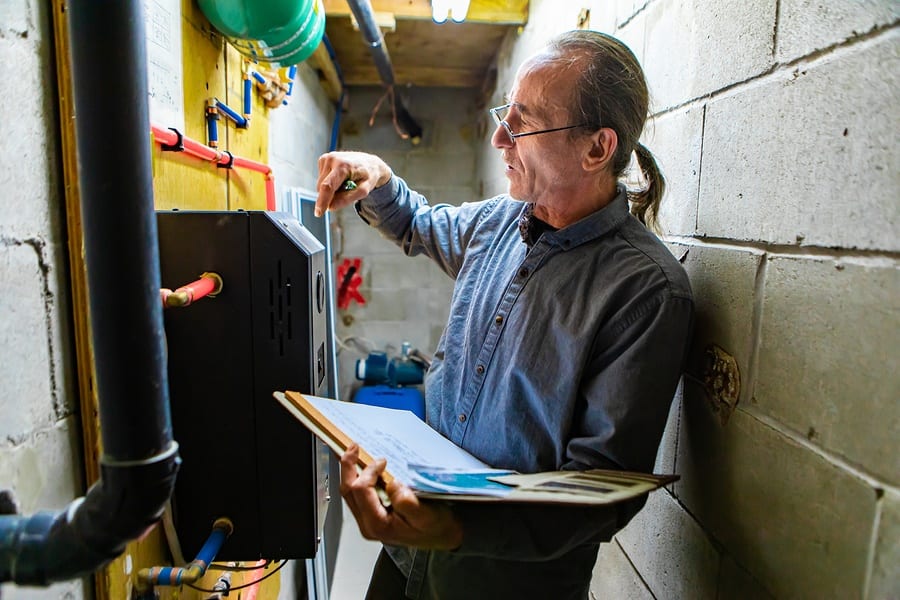
A buyer certainly has a lot on their mind. Not only must they make the decision to make one of the biggest purchases in their life, they also have to coordinate mortgage loans, the potential sale of a previous home, and a litany of other issues.
But sometimes lost in the entire process is the home inspection. This certainly should not be taken lightly or overlooked. In some cases, a buyer doesn’t even know that the inspection is part of the process, let alone know its purpose. This home inspection process is actually extremely important. It could even determine whether you go ahead with the purchase or abandon it. Or potentially you might need to go back to the drawing board with the owner and come up with a new plan. So let’s discuss the inspection, what it is, why we get one, and what we do after we get the final report.
What is a Home Inspection
According to Homeinspector, it’s a visual inspection of the home. This will include:
- Foundation, roof, other physical structures,
- Air conditioning system
- Plumbing and electrical systems
- Walls, ceilings, floors
In other words, the inspector is checking out the condition of the home to make sure there are no surprises when you move in. The buyer doesn’t want to move in only to discover that there are thousands of dollars in needed repairs. A home needs constant maintenance and repair throughout its lifespan.
Although the inspection is usually paid for by the buyer, a diligent homeowner may also have one done pre-listing. This allows the seller to get a head start and potentially discover any repairs that need to be made.
Who Performs the Inspection
The inspection will be performed by a licensed individual. Licensing will vary by state. So an inspector in Houston will have alternative training requirements than one in Boston. You should never attempt to perform it on your own. The inspector has extensive knowledge that you probably don’t have. This is their profession and they will prepare a full report for you to view after its conclusion.
Why We Get Inspections
There is a very big reason why we get home inspections. That is to save the buyer from making a purchase, whereby the product has severe flaws that require immediate attention.
When compared to the price of a home, the inspection is really cheap. They usually come in the range between $200-$600, depending on a variety of factors. These include but are not limited to the location of the home, the square footage, and the age of the dwelling.
Home inspections are not required for the sale of the home. However, there very few reasons you would choose not to have one performed.
- If the seller already prepaid for the inspection and you trust the inspector, this might qualify.
- Also imagine that there are multiple offers on the home, you might tell the seller that you would forgo the inspection if they accepted your offer. But beware, this carries risk.
The Actual Inspection Process
Since the majority of the inspections are paid by the buyers, it’s up to you to choose a company, set-up a time, and hopefully be present. Yes we recommend that if you can, to attend the actual process. Although you will receive a final report, you might actually be able to speak with the individual during the process. Here are a few guidelines to follow.
- Don’t interrupt the inspector by making conversation or asking questions. There will be time for this after he/she has completed the full process.
- Ask your real estate agent to attend it with you.
- Keep your eyes and ears open. Some inspectors may actually walk you through the process of what they are doing, and provide valuable feedback you just cannot find in the report.
After the inspection has concluded, make sure they have your email address/phone number so they can send you the written report. This will be a very important document.
How to Read an Inspection Report
Some buyers fear they won’t be able to understand everything in the report. But don’t despair, most people don’t. Your inspector should be able to answer any questions you have.
Also another great point. Expect the report to highlight many potential issues. All homes will have problems and suggestions. This doesn’t mean that you should cancel the sale of the home. Remember the individual you hired should set aside time to answer your questions. Your seasoned realtor should also have extensive knowledge as well. They should be able to offer you their feedback as well.
Handling the Issues
So you have the report and all of the highlighted issues. There will be varying causes of concern. For example, the report could conclude that there is evidence of termite infestation or evidence of rodents. Maybe the inspector surmised there are chimney issues. These can be extremely costly to remedy. These can all be described as defects. Have your realtor send over the report to the sellers’ agent.
You should know that in most cases the inspection is not a reason to re-negotiate the price of the home, unless special circumstances (big issues) exist.
Here are the options that as a buyer you will have.
- You conclude that certain damages exist. The seller should make the repairs so the sale can move forward. This means that you would need to enter another phase of negotiation with the seller. An option would be for the seller to pay you in cash for the needed repairs. Or the seller could discount the house. It’s also possible that the seller doesn’t want to make or pay for any of the repairs.
- You might decide that there are just too many repairs, or that they are too significant. A home with termites might be just too much to bear. At this point, you could pull out and continue your search for another home.
- The inspection report might highlight that no major repairs are needed. You would then most likely follow through with the purchase and move-in. But don’t throw away the report. You might decide that you want to follow some of the suggestions after you move in.
Final Take-Aways
- The home inspection should not be overlooked. It’s extremely important and doesn’t cost much money. In fact, you may pay much more in the long run if you decide to bypass this process.
- Remember to ask your inspector any questions after they have concluded their work.
- Your realtor works for you. Get them involved!
Andrew Reichek is a real estate agent with Rentkidz apartment finders. His company helps consumers find appropriate housing.




